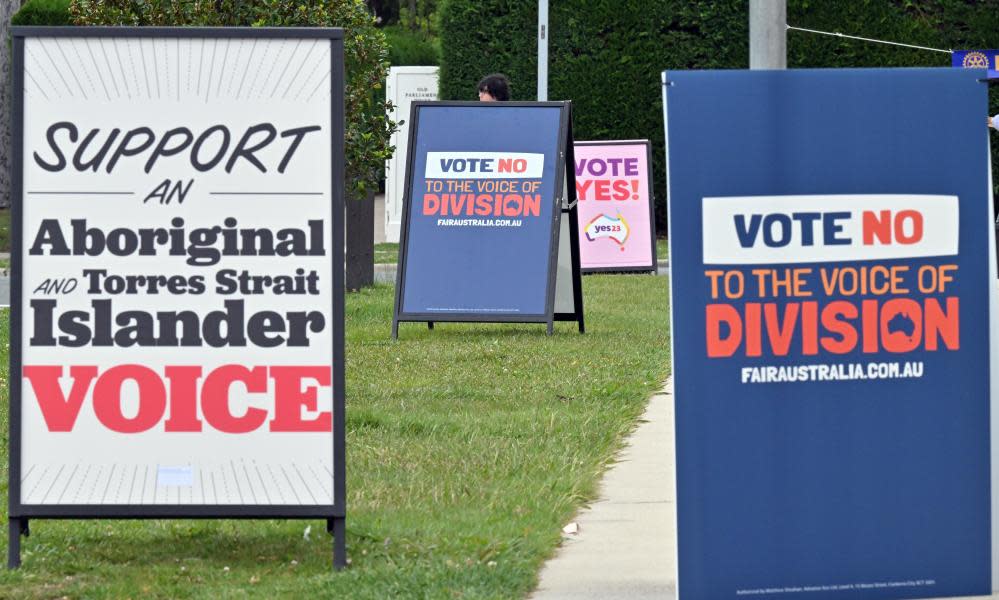Almost nine in ten Australians support plan to outlaw lies in political advertising, poll shows

Almost nine in 10 Australians support truth in political advertising laws, with majorities of both yes and no voters concerned about “lies and misinformation” during the voice referendum debate.
Those are the results of a survey of 1,547 voters by the Australian Institute conducted from the close of polls on Saturday evening to Tuesday, which also calls on the Albanese government to come up with new solutions to close the gap.
The results are a further boost for Labor’s plans to introduce truth in political advertising laws ahead of the next federal election, which the prime minister, Anthony Albanese, has confirmed in following the referendum defeat.
Around 87% of those surveyed called for truth in political advertising laws in time for the next election, including 92% of those who voted yes for an Indigenous voice in the constitution and 83% of those who voted no.
Respondents were asked if they agreed with the proposition, “I am concerned about lies and misinformation that circulated on social media during the referendum campaign.”
About 72% said they were concerned, compared with 15% who said they were not. Of those who voted yes, 89% were concerned; of those who voted no, 62% were concerned.
The Labor senator Jana Stewart said it was “unfortunate” that millions of Australians “went into the polling booths with fear instead of facts”.
She cited false claims that the voice would mean non-Indigenous Australians lost the right to fish and a fake letter purportedly from the First People’s Assembly of Victoria telling landowners to take steps to protect their properties.
“It’s not surprising people were fearful of what this could look like when they’re being deliberately peddled mis- and disinformation … It’s really unfortunate that we see in the no campaign roll out Trumpian-style politics of mis- and disinformation in some of the most marginalised and disenfranchised communities,” Stewart said.
The Australia Institute director, Richard Denniss, said, “while I have no doubt that all the votes cast in the referendum were valid, I also have no doubt that many of the arguments and claims that influenced those votes were not”.
“Whether it is an election or a referendum, voters should go to the polls armed with the facts,” he said. “In Australia, it is perfectly legal to lie in a political ad – and it shouldn’t be.”
In South Australia the electoral commission can request materially inaccurate and misleading political advertising be withdrawn and retracted or seek financial penalties for of $5,000 for individuals or $25,000 for a corporation.
In July 2022 Guardian Australia revealed federal Labor intended to introduce such laws, a proposal it intends to legislate along with political spending and donation caps.
In question time on Tuesday the independent MP, Zali Steggall, pressed Albanese to protect voters against “misleading and deceptive” political advertising.
Albanese said he understood the concern about misinformation which “in some cases is just about politics but in some cases can be dangerous”. Albanese cited antisemitic material advocating a no vote in the voice referendum.
The prime minister said legislating in this area was “complex”, but confirmed the special minister of state was working on a bill.
“You don’t want to interfere with any freedom of expression, but you also want to make sure that elections and democratic process can be held in an appropriate way.”
The Australian Institute poll used an online Dynata panel with nationally representative samples by gender, age group and state/territory. It polled 1,005 people, with a further 416 South Australians and 126 Queenslanders to produce more precise results, weighted to ensure those states were not overrepresented.
Two in three voters (65%) agreed that more needs to be done to address the disadvantage experienced by Aboriginal and Torres Strait Islander people, compared with 28% who disagreed.
Even half of those who voted no to the voice agree that more needs to be done to address the disadvantage experienced by Aboriginal and Torres Strait Islander people, while 42% of no voters disagreed.
Asked if it was up to the Albanese government to come up with solutions to close the gap, 72% agreed. Just 47% said it was up to no campaigners to come up with solutions.

 Yahoo News
Yahoo News 
